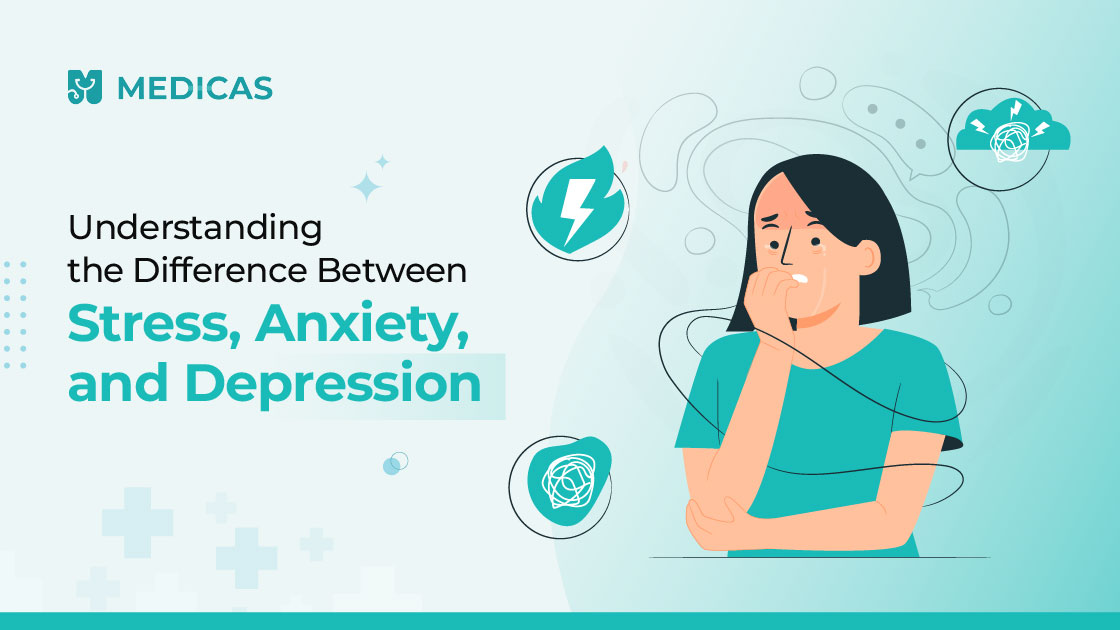Feeling overwhelmed? It’s easy to confuse stress, anxiety, and depression, especially when life throws curveballs. This article breaks down the difference between stress, anxiety and depression, helping you understand the nuances of each and when to seek support. We’ll cover everything from what stress is to the specific symptoms of anxiety and depression.
What is Stress?
Stress is a natural human response to demands and pressures. It’s that feeling of being overwhelmed, whether by work deadlines, relationship issues, or financial worries. While short-term stress can sometimes be motivating, chronic stress can negatively impact your health. Everyone experiences stress in their life at various instances which differs for person to person, and recognizing the personal triggers is the first step to managing it.
Understanding Anxiety
Anxiety is more than just feeling stressed. It’s characterized by persistent worry, fear, and uneasiness of body and mind that can interfere with daily life. It might manifest as physical symptoms like a racing heart, excessive sweating, heaviness of head, choking sensation, breathlessness, cold sensation over body and many more . While everyone experiences anxiety occasionally, an anxiety disorder involves excessive and persistent worry that’s difficult for more days of a week and difficult to control.
Different Types of Anxiety Disorders
- Generalized Anxiety Disorder (GAD)
- Social Anxiety Disorder
- Panic Disorder
- Specific Phobias
Common Causes of Anxiety
The causes of anxiety are multifaceted and can include genetics, brain chemistry, personality traits, and life experiences. Traumatic events, chronic illnesses, and even certain medications can also trigger or worsen anxiety. Identifying potential triggers is crucial for developing effective coping mechanisms.
Lifestyle Factors Contributing to Anxiety
- Excessive caffeine or alcohol consumption
- Lack of sleep
- Poor diet
- Social isolation
- Life stress,
- Traumatic events
Delving into Depression
Depression is a mood disorder characterized by persistent feelings of sadness, hopelessness, and loss of interest in activities you once enjoyed. It’s more than just feeling down for a few days; it’s a serious condition that can significantly impact your ability to function. Recognizing the symptoms is key to seeking timely help.
Exploring Different Types of Depression
Understanding the types of depression is crucial for tailored treatment. Major Depressive Disorder is the most common, but other forms include Persistent Depressive Disorder (dysthymia), Seasonal Affective Disorder (SAD), and postpartum depression. Each type has its unique characteristics and requires specific management strategies.
A Closer Look at Depression Types
- Major Depressive Disorder: Characterized by persistent sadness and loss of interest in previously interested things, easy fatigability, associated with sleep and appetite changes, which is lasting more than 2 week. This could be serious as it start to affect your social, biological and functional domains to a greater extend.
- Persistent Depressive Disorder (Dysthymia): A chronic, low-grade depression lasting for at least two years.
- Seasonal Affective Disorder (SAD): Depression related to changes in seasons, typically occurring in winter.
- Postpartum Depression: Depression that occurs after childbirth. And even it can be seen during the pregnancy time, due to the hormonal changes and stree.
Key Symptoms of Depression
The symptoms of depression vary from person to person but often include persistent sadness, fatigue, changes in appetite or sleep, difficulty concentrating, and feelings of worthlessness. Some people may also experience physical symptoms like headaches or digestive problems. Recognizing these signs is vital for seeking help.
Stress vs. Anxiety: Key Distinctions
While stress and anxiety often go hand in hand, understanding their differences is crucial. Stress is typically triggered by an external factor and resolves when the stressor is removed. Anxiety, on the other hand, is a persistent feeling of worry and unease that can linger even in the absence of a clear stressor. This distinction is important for effective management.
Anxiety vs. Depression: Unveiling the Differences
Although anxiety and depression can co-exist, they are distinct conditions. Anxiety is characterized by excessive worry and fear, while depression is marked by persistent sadness and loss of interest. Recognizing these differences helps in seeking targeted treatment and support. Sometimes, distinguishing them requires professional assessment.
Anxiety vs. Depression: A Comparative Overview
| Feature | Anxiety | Depression |
| Dominant Emotion | Worry, Fear | Sadness, Hopelessness |
| Primary Focus | Future Threats | Past Experiences |
| Energy Levels | Restlessness, Agitation | Fatigue, Lethargy |
Overlapping Symptoms of Anxiety and Depression
The symptoms of anxiety and depression can sometimes overlap, making it challenging to differentiate between the two. Both conditions can manifest as difficulty sleeping, changes in appetite, fatigue, and difficulty concentrating. This overlap underscores the importance of a comprehensive assessment by a mental health professional.
Depression in Women: Unique Considerations
The signs of depression in women can sometimes differ from those in men due to hormonal factors, social pressures, and life experiences. Women are also more likely to experience certain types of depression, such as postpartum depression. Understanding these unique considerations is vital for providing tailored support and treatment.
Hormonal Factors and Depression in Women
- Menstrual cycle fluctuations
- Pregnancy and postpartum period
- Menopause
When to Seek Professional Help
If you’re struggling with persistent stress, anxiety, or depression that is impacting your daily life, it’s crucial to seek professional help. A mental health professional can provide an accurate diagnosis, develop a personalized treatment plan, and offer support and guidance. Don’t hesitate to reach out; your mental health is just as important as your physical health. Consider a Book appointment with a qualified mental health professional today.
Home Remedies and Self-Care Strategies
In addition to professional treatment, self-care strategies and home remedies can play a significant role in managing stress, anxiety, and depression in the initial stage and those of mild intensity . These might include regular exercise, a balanced diet, sufficient sleep, mindfulness practices, and connecting with loved ones. Explore various Home remedies to find what works best for you. A healthy lifestyle supports mental well-being.
Effective Stress Management Techniques
- Deep breathing exercises
- Regular physical activity
- Mindfulness and meditation
- Spending time in nature
- Connecting with loved ones
The Convenience of Online Doctor Consultation
Accessing mental health support has become easier than ever with the advent of online platforms. Online Doctor Consultation offers a convenient and accessible way to connect with mental health professionals from the comfort of your own home. This can be particularly beneficial for those who face barriers to traditional in-person care. You can also Book Lab Test for diagnostic purposes to understand your condition better.
Frequently Asked Questions about Stress, Anxiety and Depression
- What are the emotional symptoms of anxiety and depression?
Anxiety can manifest as excessive worry, fear, irritability, and restlessness. Depression often involves persistent sadness, hopelessness, loss of interest in activities, and feelings of worthlessness. Both conditions can also lead to difficulty concentrating and making decisions. Understanding the specific emotional symptoms you’re experiencing can help guide you toward appropriate support.
- How does depression affect women differently than men?
Depression in women can be influenced by hormonal fluctuations related to menstruation, pregnancy, and menopause. Women are also more likely to experience certain types of depression, such as postpartum depression and Seasonal Affective Disorder (SAD). Social and cultural factors can also play a role in how depression manifests and is experienced by women.
- Can stress lead to anxiety or depression over time?
Yes, chronic stress can significantly increase the risk of developing anxiety or depression. Prolonged exposure to stressors can disrupt the body’s stress response system and lead to changes in brain chemistry that contribute to mental health issues. Managing stress effectively is crucial for preventing the development of anxiety and depression.
- When should you consult a mental health professional?
You should consult a mental health professional if you’re experiencing persistent symptoms of stress, anxiety, or depression that are interfering with your daily life, relationships, or work. Other warning signs include thoughts of self-harm, difficulty sleeping or eating, and a loss of interest in activities you once enjoyed. Seeking help early can significantly improve your outcomes.
Disclaimer
Medical Advice: The information provided in this blog post is for educational purposes only and should not be considered as a substitute for professional medical advice, diagnosis, or treatment. Always consult with a qualified healthcare professional for personalized guidance regarding your specific medical condition.
Accuracy of Information: While we strive to provide accurate and up-to-date information, the field of medicine and viral fevers is constantly evolving. The content in this blog post may not reflect the most current research or medical guidelines. Therefore, it is advisable to cross-check any information provided with reliable sources or consult a healthcare professional.
Individual Variations: The symptoms, causes, treatment options, and preventive measures discussed in this blog post are general in nature and may not apply to everyone. It is important to remember that each individual’s situation is unique, and personalized medical advice should be sought when making healthcare decisions.
External Links: This blog post may contain links to external websites or resources for additional information. However, we do not endorse or have control over the content of these third-party websites. Accessing these links is done at your own risk, and we are not responsible for any consequences or damages that may arise from visiting these external sources.
Results May Vary: The effectiveness of treatment options or preventive measures mentioned in this blog post may vary from person to person. What works for one individual may not work the same way for another. It is essential to consult with a healthcare professional for personalized advice tailored to your specific needs.

Dr. Sreerag Ashok is a neuropsychiatrist with comprehensive experience in managing a wide spectrum of mental health conditions, including mood and anxiety disorders, OCD, ADHD, and substance use disorders. He holds an MBBS and an MD in Psychiatry, and has trained at esteemed institutions such as St. John’s Medical College, Bangalore. He has also served as Chief Medical Officer at Josco Multispeciality Hospital in Kerala.


